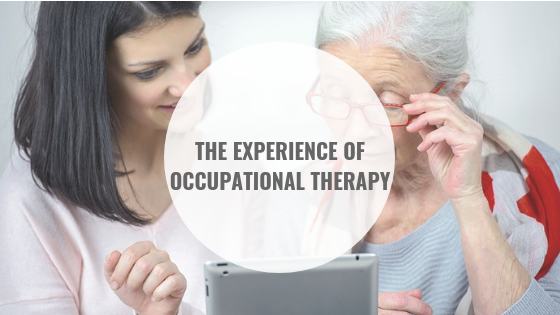Julie Entwistle, MBA, BHSc (OT), BSc (Health / Gerontology)
Many people still don’t know what occupational therapy is and the benefits it can provide. If you are a subscriber to this blog, hopefully we have helped you over the last many years to get a better understanding about our profession. But I have always said that the best way to understand occupational therapy is to experience it. Here in our practice lawyers and insurers “experience” occupational therapy through recognizing that we can help move people through a recovery or trauma process and they entrust us to do so honestly, ethically and professionally. Families also “experience” occupational therapy through watching their loved one hopefully “do and manage better” because of our involvement. But what about the clients themselves? Those people that need our services and who build lasting relationships with us as we assist them through some very difficult and trying times? What do they experience?
Well, the regulated health professions act does not allow us to use “testimonials” in “advertising” because these are not verifiable and are often biased. This act is from 1991, long before the internet allowed us to “rate our anything” and review everything from face cream to shoelaces to our local restaurant using one to five stars. We know we can’t tell you the stories of the people we help, but last October for OT Month we followed the lead of the Ontario Society of Occupational Therapists (OSOT) by embracing the challenge of asking the people we treat two very important questions:
“What do you value most about occupational therapy so far?”
“How do you feel I have helped you the most in our work together?”
The answers from our clients were helpful, insightful and rewarding. And while I can’t repeat them verbatim here, I can tell you the themes of people’s experiences with occupational therapy as noted by us:
The Most Value
A common response under “what do you value most about occupational therapy” was that we help clients to add “tools to the toolbox”. Clients seem to appreciate that occupational therapy has provided them with new skills and strategies that they can put in their back pocket to retrieve when needed. We have taught them how to help themselves and have given them the resources and support to do so. And when they are not able to help themselves, we grab the tool for them and show them the way. The tools they learn from us help them to expedite recovery and get them there faster. Kind of like an accountant or bookkeeper doing your taxes – using a professional gets the job done faster and with greater accuracy. We don’t know what we don’t know.
A second value related to the support we provide in helping them to navigate some very difficult systems. The insurance system is complicated enough, but when two or more systems get pitted against each other the client is caught in the crossfire. Insurers will argue they are the third payer after OHIP and extended health. The CCAC will argue they are the third payer and “don’t provide service to people that have insurance”. Extended health will say “we can’t talk to you, only the client” and then the client will be told “there is no coverage for occupational therapy” but the other insurer needs to have a denial from them to be sure. How do you submit for services you are told you don’t have? You can’t so the cycle continues. Our clients value our role in helping them to get the services they need when they need them. We understand these complicated systems and help to prevent people from falling through the cracks. We also identify gaps in services and bridge these through connecting clients to other providers, services, supports and resources.
The Most Impact
The answers to the question about impact varied on a spectrum of education regarding injuries and symptoms to “you literally saved my life”. But the common thread included the more human aspects of the occupational therapist providing validation, understanding and teaching a recovery-minded thought process that people would not necessarily develop on their own. People valued being heard and the unique approach the occupational therapist took to be practical, relatable, and progressive. The value came in the customization – from person to person and visit to visit.
My favorite quote from this qualitative gathering of feedback was this:
And don’t be fooled by the title occupational therapist. My occupation at the time of my injury was “retired” and it’s a lifetime job I take very seriously.
Occupation for us is about how you spend your time – all of your time – from sleeping to “retiring” it is all important for you and to you. (check out our Occupation Is series to learn more) If injury or disability is preventing you from spending your time the way you want, consider occupational therapy.

